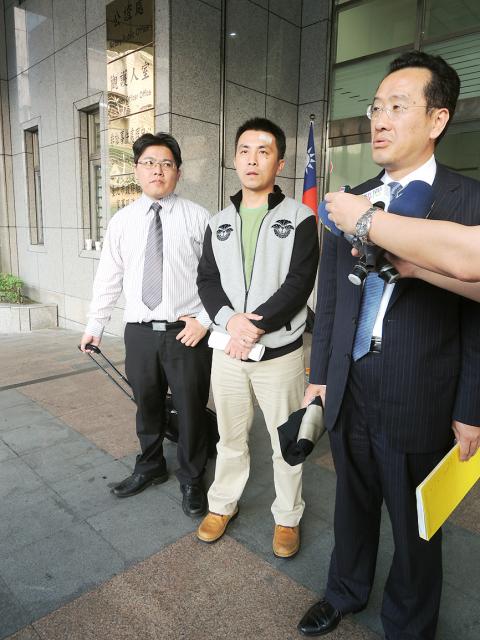The Taipei District Court on Friday ruled that the Taipei City Government must pay NT$300,000 in compensation to a man who was beaten by police during a crackdown on the Sunflower movement protests at the Executive Yuan in March and April last year.
Lin Ming-hui (林明慧), a teacher from Taichung, filed the suit alleging excessive use of force in violation of the Act Governing the Use of Police Weapons (警械使用條例).
Lin sought compensation from the Executive Yuan, Taipei City Government, National Police Agency and Taipei City Police Department.

Photo: Chang Wen-chuan, Taipei Times
Lin said he took part in a sit-in protest at the Executive Yuan on March 24 last year.
“The protesters sat on the ground peacefully, and nobody had a weapon. But the riot police used violent tactics and wielded batons, striking people,” he said.
A picture of Lin walking away to receive medical treatment, his face and clothing covered in blood, was among the most prominent photographs featured in media coverage of the protesters’ occupation of the Executive Yuan.
Following Friday’s ruling, Taipei Mayor Ko Wen-je (柯文哲) said that his government would not appeal the decision.
Lin said he wants to salute the judge for the decision, as winning the case has symbolic meaning.
“However, the government is still applying the same old authoritarian thinking to the current protest by high-school students against textbook curriculum guideline changes,” he said.
Lawyer Wellington Koo (顧立雄) said the ruling was to rectify the government’s unlawful actions and could be used for reference in future litigation.
“It was regrettable that the court did not hold former premier Jiang Yi-huah (江宜樺) responsible, as he ordered the police to remove the protesters,” Koo said.
The ruling cited the use of excessive police force against protesters, as Lin was holding on to another person next to him when police tried to disperse the crowd by pulling them away one by one.
“Police may use physical force to remove and carry people away, but when using batons, the officers should only have struck at Lin’s hands, and not at his head,” the ruling said.
It added that in Lin’s case, the officers had violated Articles 9 and 10 of the Act Governing the Use of Police Weapons, which state: “The police should avoid using lethal force unless the situation is so imminent that the lives of officers or bystanders are being threatened,” and “after using the police weapons, the police officer must report his/her use to his/her immediate supervisors except for using a baton as a way to give directions.”
Throughout the hearing and investigation, the police force did not take steps to identify the officer who hit Lin. Instead, it gave the captain of the riot police squad two demerits as punishment.
Lin’s lawyer, Lu Chiu-yuan (呂秋遠), said that was not good enough.
“It has been over a year since the incident, but police are still unable to find out the identity of the officer,” he said. “I hope Mayor Ko can help to find the officer responsible, because we must not let taxpayers foot the bill for police violence.”

CHAOS: Iranians took to the streets playing celebratory music after reports of Khamenei’s death on Saturday, while mourners also gathered in Tehran yesterday Iranian Supreme Leader Ayatollah Ali Khamenei was killed in a major attack on Iran launched by Israel and the US, throwing the future of the Islamic republic into doubt and raising the risk of regional instability. Iranian state television and the state-run IRNA news agency announced the 86-year-old’s death early yesterday. US President Donald Trump said it gave Iranians their “greatest chance” to “take back” their country. The announcements came after a joint US and Israeli aerial bombardment that targeted Iranian military and governmental sites. Trump said the “heavy and pinpoint bombing” would continue through the week or as long

TRUST: The KMT said it respected the US’ timing and considerations, and hoped it would continue to honor its commitments to helping Taiwan bolster its defenses and deterrence US President Donald Trump is delaying a multibillion-dollar arms sale to Taiwan to ensure his visit to Beijing is successful, a New York Times report said. The weapons sales package has stalled in the US Department of State, the report said, citing US officials it did not identify. The White House has told agencies not to push forward ahead of Trump’s meeting with Chinese President Xi Jinping (習近平), it said. The two last month held a phone call to discuss trade and geopolitical flashpoints ahead of the summit. Xi raised the Taiwan issue and urged the US to handle arms sales to

State-run CPC Corp, Taiwan (CPC, 台灣中油) yesterday said that it had confirmed on Saturday night with its liquefied natural gas (LNG) and crude oil suppliers that shipments are proceeding as scheduled and that domestic supplies remain unaffected. The CPC yesterday announced the gasoline and diesel prices will rise by NT$0.2 and NT$0.4 per liter, respectively, starting Monday, citing Middle East tensions and blizzards in the eastern United States. CPC also iterated it has been reducing the proportion of crude oil imports from the Middle East and diversifying its supply sources in the past few years in response to geopolitical risks, expanding

Pro-democracy media tycoon Jimmy Lai’s (黎智英) fraud conviction and prison sentence were yesterday overturned by a Hong Kong court, in a surprise legal decision that comes soon after Lai was jailed for 20 years on a separate national security charge. Judges Jeremy Poon (潘兆初), Anthea Pang (彭寶琴) and Derek Pang (彭偉昌) said in the judgement that they allowed the appeal from Lai, and another defendant in the case, to proceed, as a lower court judge had “erred.” “The Court of Appeal gave them leave to appeal against their conviction, allowed their appeals, quashed the convictions and set aside the sentences,” the judges